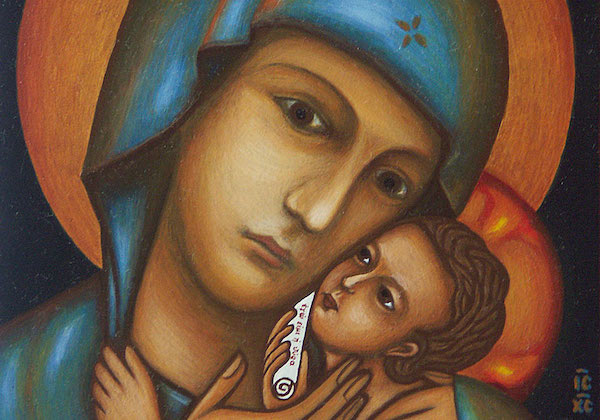Quick Apology: Is Mary “Mother of God”?
Objection
In today’s post I’d like to offer a quick apology to the following objection:
“Mary is the mother of Jesus, she’s not the ‘Mother of God'”
The idea being expressed here was championed by Nestorius in the 5th Century and condemned at the Council of Ephesus (AD 431). Unfortunately, this is a sentiment often expressed by many Protestants when they hear Catholics and Eastern Orthodox Christians refer to Mary as “Mother of God”.
Response
In responding to this objection, I simply put forward a few logical statements:
1. Jesus is God
2. Mary gave birth to Jesus
3. Therefore, Mary is the mother of God
I then ask the person with whom I am speaking to identify the perceived error. Does he deny that Jesus is God? Does he deny that Mary gave birth to Jesus? If Jesus is God and Mary gave birth to Him, doesn’t “Mother of God” seems to be an appropriately descriptive title?
To put it in terms of Scripture, in Luke’s Gospel, St. Elizabeth says to Mary “And why is this granted me, that the mother of my Lord should come to me?” (Luke 1:43). Is Elizabeth’s “Lord” God? Yes or No? If her “Lord” is God then Mary is “the mother of [her] Lord[/God]”.
One might also consider the Deuteronomic command to “Honour your father and mother” (Deuteronomy 5:16). As we all know, Jesus fulfilled the Law perfectly. So, in fulfilling this command, whom did He honour?
Contrary to what is often proposed, Mary being “Mother of God” does not make her greater than Jesus. It simply establishes her relationship with her Son and Saviour and, like the pronouncements of the Council of Ephesus, safeguards the Church’s teaching concerning the divinity of Christ.

I liked this. Nice and simple.
Is not one of the issues with this, that mother suggests a point of creation, a source. And while I can see that Mary is the source for the human part of the incarnation, that she is not the source of the divine part. (Also as a side note that the second person of the trinity as we know was always present, and again the suggestion of mother is that this was a point of creation, rather than incarnation).
In general I find the term Theotokos – and when working in English, “the one who gives birth to God” – as something that protestants can get their head round with less difficulty.
Hey Rev, thanks for commenting
> Is not one of the issues with this, that mother suggests a point of creation, a source
Just because it does in the normal course of things, does not mean it automatically applies when it comes to the Faith and the economy of salvation.
For example, consider the names of the persons of the Trinity – Father and Son. In the normal course of human family life:
1. There is also a wife
2. This wife engages in sexual union with the father
3. This act gives rise to the creation of a new being, a son
Do these things happen in the life of the Trinity? Nope. The names “Father” and “Son” are theologically laden and must therefore be handled carefully. I would say the same is true of “Theotokos” and “Mother of God”.
> And while I can see that Mary is the source for the human part of the incarnation, that she is not the source of the divine part.
We have to make sure our Christology remains within the bounds of orthodoxy. Christ has both a human and divine nature, but He is a single person. Mothers do not give birth to natures, they give birth to persons.
> (Also as a side note that the second person of the trinity as we know was always present, and again the suggestion of mother is that this was a point of creation, rather than incarnation).
Agreed, but one would only reach the conclusion that the second person of the Trinity came into existence at the Incarnation if one ignored the rest of what the Church teaches. If someone does that, who is really to blame? You could do that with any Christian doctrine, not just those that surround Blessed Mary. In fact, most Christological heresies did just this – neglect some aspect of the Lord (monothelitism, monophysitism etc)
> In general I find the term Theotokos – and when working in English, “the one who gives birth to God” – as something that protestants can get their head round with less difficulty.
I can see why, but at the same time, the two titles express the same reality. I think it’s just that “Mother of God” carries some more baggage for someone raised Protestant. Either way, I think these titles cease to become offensive when viewed in the totality of the Church’s teaching on the Lord’s mother.
I’d say I agree with most of what is said above, I think in part the issue is one of language, the difference between common usage and technical/theological usage. Working in a bilingual culture it is something very common, where a word in one language that sums up the ideas well (in this case Theotokos), does not have a corresponding word in other languages, and thus needs more work to explain the meaning.
Agreed!
And his gifts were that some should be apostles, some prophets, some evangelists, some pastors and teachers, for the equipment of the saints, for the work of ministry, for building up the body of Christ… – Ephesians 4:11-12